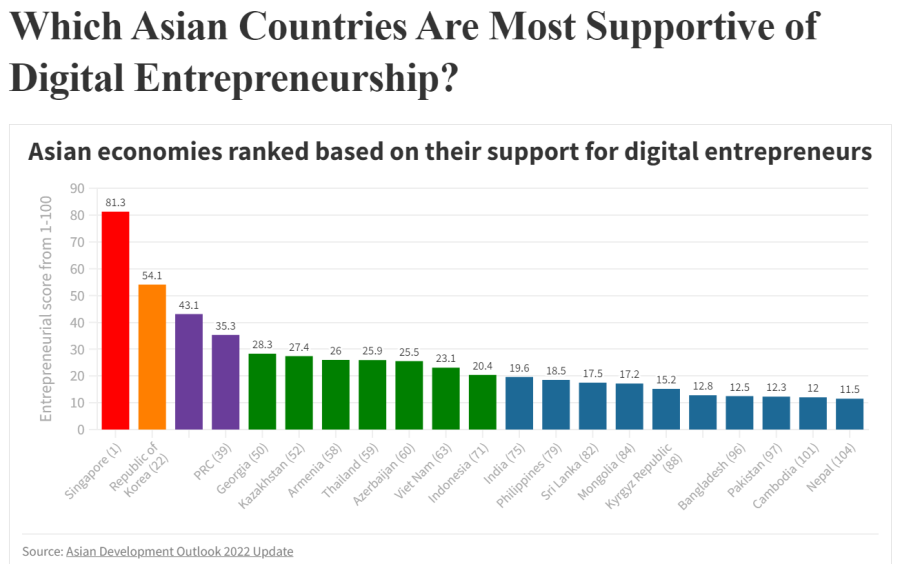Money
Nepal ranks way down in digital entrepreneurship and innovation
The Himalayan republic is 104th among 113 economies in digital environments, and 111th among 132 countries in innovation, reports show.
Krishana Prasain
Nepal's performance in digital entrepreneurship and innovation has been shown to be very poor, coming at the bottom of two global rankings.
The reports published by the Asian Development Bank and the World Intellectual Property Organisation both have given Nepal very low marks in these aspects.
Nepal is ranked 104th in the multilateral funding agency's list of 113 economies in digital environments and support systems for entrepreneurs. Singapore tops the list.
The index measures the quality of the environment for digital entrepreneurs by looking at the level of digitalisation in eight areas: culture, institutions, market conditions, infrastructure, human capital, knowledge, finance and networking.
During Covid-19, information and communication technology helped entrepreneurs weather the unprecedented economic hardship due to lockdowns. For example, restaurateurs who were forced to close their restaurants were able to keep their businesses afloat with online orders.
Such entrepreneurial resilience, in turn, contributed to the resilience of the overall economy and society, the Asian Development Bank said.
“Going forward, digital entrepreneurship is not only vital for economic resilience but can potentially become an engine of growth in the post-pandemic world.”
Separately, the Global Innovation Index 2022 published by the World Intellectual Property Organisation has ranked Nepal in the 111th position out of 132 countries.
Analysts say the reason for the poor showing in the list created by the specialised agency of the United Nations is lack of research and development or a think tank at the national level.
Nepal's private and public sectors view investing in research and development as an expense. Huge investments have to be made for research, development and innovation, they said.
India has achieved a milestone and is number one in innovation in Central and Southern Asia. Globally, India is in the 40th position.
The Global Innovation Index has put Switzerland, the United States and Sweden in the first, second and third positions respectively. China is 11th, Pakistan 87th, Sri Lanka 85th, Bangladesh 102nd and Iran 53rd in innovation.
Strong laws are required in intellectual property rights, trademarks and copyrights to compete in the global market, according to Nepali entrepreneurs.
Rohit Tiwari, founder of Foodmario, one of the successful start-ups in Nepal that sells food online, says the government has not been able to create an environment for innovative businesses.
“The country lacks strong laws, policies and investment in both innovation and digital entrepreneurship,” he said.
According to Tiwari, who is also CEO of Hamrobazar.com, organisations in the private sector do not have a separate research and development department, and do not invest in it either.
“There is a cultural setback when it comes to investing in research and development,” he said.
Globally, science and innovation investments were soaring at the height of the Covid-19 pandemic, but their continued resilience is uncertain for 2022 in the face of new challenges, according to the reports.
Amun Thapa, founder of online marketplace Sastodeal, does not agree that Nepal’s innovation and digital entrepreneurship is lagging behind.
“If we look at the trend of e-commerce in Nepal, it is growing fast. We expect it to increase 10-fold to more than $1 billion by 2025,” Thapa said.
In Nepal, the internet penetration rate is the same as in India and China, and smartphone adaptation is nearly 50 percent. “This shows that Nepal is doing well in digital entrepreneurship.”
But he says that in terms of innovation, Nepal is still at an infant stage. “It has not even been five years since tech-based businesses opened here,” said Thapa. "There are many entrepreneurs who are coming up with new business ideas, and this ecosystem may take time to show results."
Industry insiders say that many colleges are now teaching entrepreneurship courses, an innovation which did not exist in Nepal 10 years ago.
Most of the businesses here have been started by youths who are connected with tech, according to Thapa. But still, investment in research and development is negligible, he says.
One reason for Nepali companies not investing in research and development is mainly uncertainty of its future, according to Tiwari. “Nepali companies are primarily focused on getting fast returns.”
“We need to invest time and money if we want to get output. The more we spend on research and development, the more we become able to compete in the global market,” Tiwari said.
Usually, technology companies have a separate department for research and development as they develop a business based on it.
According to the reports, the slowdown in innovation in middle and low-income economies is due to reduced corporate income and lower government revenues with reduced access to financial markets, depressing the technology investment.
Also, many developing countries have experienced setbacks to their education and human capital base, accentuating existing skills shortages due to Covid-19.
The Covid-19 pandemic has supposedly accelerated technology adoption and diffusion, in particular, the digitalisation and novel forms of remote working.
Most developing country firms are far behind the technological frontier and find it difficult to adopt technologies, particularly micro-enterprises and informal enterprises, the report said.




 20.12°C Kathmandu
20.12°C Kathmandu














